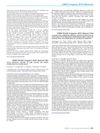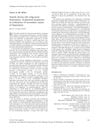 January 2016 in “International Journal of Medical Research and Health Sciences”
January 2016 in “International Journal of Medical Research and Health Sciences” People with hair loss conditions like Telogen Effluvium and Alopecia Areata often feel scalp pain and are more likely to have anxiety, but not necessarily depression.
 October 2010 in “Journal of Men's Health”
October 2010 in “Journal of Men's Health” Some patients may experience lasting sexual dysfunction, depression, and other side effects from 5α-reductase inhibitor therapy.
 August 2024 in “Archives of Women s Mental Health”
August 2024 in “Archives of Women s Mental Health” Women with PCOS have more depression and stress due to high androgen levels, not obesity or insulin resistance.
 December 2023 in “Alzheimer's & dementia”
December 2023 in “Alzheimer's & dementia” Finasteride may help reduce anxiety and depression in elderly but might cause depression in young men.
 October 1971 in “The BMJ”
October 1971 in “The BMJ” Hair loss can be linked to hormonal changes, and physical conditions like heart defects can cause depression.
December 2022 in “JAMA network open” 5α-Reductase inhibitors may increase depression risk but not dementia or suicide.
 April 2021 in “Reactions Weekly”
April 2021 in “Reactions Weekly” Finasteride increases risk of depression, possibly suicidal thoughts, and sexual dysfunction.
 November 2003 in “Journal of Dermatology”
November 2003 in “Journal of Dermatology” Finasteride's link to depression is questionable due to study flaws and potential bias.
 November 2003 in “Journal of Dermatology”
November 2003 in “Journal of Dermatology” Authors defend finasteride-depression link, suggest detailed medical history, and call for more investigation.
 June 2017 in “Reactions Weekly”
June 2017 in “Reactions Weekly” Finasteride (Propecia) may cause depression and suicidal thoughts; stop use and inform a healthcare professional if symptoms develop.
 142 citations,
January 2019 in “Frontiers in Neuroendocrinology”
142 citations,
January 2019 in “Frontiers in Neuroendocrinology” Postpartum depression is linked to changes in brain chemicals, inflammation, stress, and certain genes, and can potentially be identified by markers like specific steroids, serotonin levels, and vitamin D levels.
 19 citations,
March 2019 in “Behavioural Brain Research”
19 citations,
March 2019 in “Behavioural Brain Research” Finasteride use can cause depression-like behavior in male rats.
11 citations,
May 2006 in “Journal of the European Academy of Dermatology and Venereology” Combining paroxetine and triamcinolone effectively treats both alopecia areata and depression.
 November 2023 in “JEADV Clinical Practice”
November 2023 in “JEADV Clinical Practice” Patients with severe alopecia areata felt better and less anxious or depressed when treated with baricitinib compared to placebo.
 June 2023 in “International journal of biology, pharmacy and allied sciences”
June 2023 in “International journal of biology, pharmacy and allied sciences” New medications are improving depression treatment, emphasizing accurate diagnosis and chronic care.
 April 2023 in “Journal of Investigative Dermatology”
April 2023 in “Journal of Investigative Dermatology” Narrowband Ultraviolet B treatment can significantly reduce anxiety in psoriasis patients, but it doesn't significantly affect depression.
 June 2016 in “CRC Press eBooks”
June 2016 in “CRC Press eBooks” Sleep problems and skin issues affect each other; poor sleep can worsen skin conditions, and some skin treatments can improve or harm sleep quality.
 January 2013 in “Psychiatry and clinical neurosciences”
January 2013 in “Psychiatry and clinical neurosciences” Physical symptoms in depression can reveal underlying medical conditions.
February 2023 in “Cureus” Male pattern baldness in medical students is linked to higher depression, loneliness, and internet addiction.
January 2023 in “Dermatologic Therapy” Androgenetic alopecia significantly affects mental health and quality of life, highlighting the need for psychiatric evaluations.
March 2021 in “Iranian journal of public health” May 2017 in “Chinese Journal of Dermatology” Alopecia negatively affects quality of life and mental health.
 9 citations,
April 2020 in “The Journal of Urology”
9 citations,
April 2020 in “The Journal of Urology” 5α-Reductase inhibitors don't cause depression.
 7 citations,
January 2019 in “Brazilian Journal of Pharmaceutical Sciences”
7 citations,
January 2019 in “Brazilian Journal of Pharmaceutical Sciences” Maidenhair fern extract reduced anxiety and depression in rats and may work due to its antioxidant and anti-inflammatory properties.
 3 citations,
August 2020 in “Urology Journal”
3 citations,
August 2020 in “Urology Journal” Using 5-alpha reductase inhibitors may increase the risk of mild depression.
 3 citations,
October 2018 in “Journal of Drug Delivery and Therapeutics”
3 citations,
October 2018 in “Journal of Drug Delivery and Therapeutics” People with polycystic ovary syndrome often experience anxiety and depression.
 2 citations,
March 2020 in “Cns & Neurological Disorders-drug Targets”
2 citations,
March 2020 in “Cns & Neurological Disorders-drug Targets” Lurasidone is effective for bipolar depression and schizophrenia, but more safety data is needed.
 2 citations,
July 2019 in “Journal of psychology & clinical psychiatry”
2 citations,
July 2019 in “Journal of psychology & clinical psychiatry” Zinc helps reduce the severity of depression.
1 citations,
January 2021 in “European Journal of Inflammation” Methylated flavonoids may effectively reduce depression and inflammation caused by finasteride.
1 citations,
August 2017 in “The Journal of urology/The journal of urology” 5α-reductase inhibitors may increase the risk of depression and suicidal thoughts.





















